
DBA Roundup
A roundup of industry expertise, exclusive resources, business support and tools for your design business.
 Is more of the same good enough?
Is more of the same good enough? You’ve delivered some great work in 2023, but don’t rest on past glories. An early reveal from the ‘2024 What Clients Think’ report* shows 59% of clients want something different from their agency next year, related to particular challenges they’re facing. Never sit back – keep asking questions.
 How will AI impact our creative industries?
How will AI impact our creative industries? In 2024, how can the creative industries remain resilient in the face of AI’s rise? And how can regulation keep pace with the transformative nature of the tools and capabilities? Will it change your business for the better or threaten it? How will you respond?
 What’s your company’s story going to be?
What’s your company’s story going to be? Your company’s story matters. It’s what you tell clients when selling to them, what you talk to talent about when recruiting them, what you tell investors when getting investment or exiting. Decisions you make now impact on your story later. Make it count!
 How will we design a better world?
How will we design a better world? Believe. Be Bold. Aim High. Transform More. Tinker Less. Find Purpose. Follow Passion. Do What Matters. Say No More. Challenge Things. Break Things. Create Better Things. Have Principles. Pay For Them. Inspire People. Support Communities. Learn More. Fear Less. Grow Your Own Way. Commit. A Better World Beckons.
 Am I part of the solution…?
Am I part of the solution…? For decades design was a driver of economic growth and over-consumption, hence an instrumental contributor to climate change and depletion of natural resources, but just like design can be part of the problem, it can be an equally powerful part of the solution. Your choice.
 How consistent was your marketing in 2023?
How consistent was your marketing in 2023? Stopping and starting marketing and new business activity is why pipelines falter. If this was you, try rethinking your objectives and strategy then plan your activity. If your strategy is right, you’ll have the confidence to implement it, if the plan is right, you’ll have the resource to stick to it.
 Are you ready for AI’s reality?
Are you ready for AI’s reality? This isn’t the time to throw in the towel on your agency’s human-led creativity. Embrace AI tools to achieve results, drive ideation and then allow your human creativity to shine alongside. This is the holy grail which will distinguish businesses of the past from those of the future.
 How well do you delegate?
How well do you delegate? Delegation is essential to business and professional growth, developing skills and assets, and building team engagement, motivation, shared purpose, trust and accountability. It frees you to work on the business not just in it, supporting future-proofing and helping to get stuff done quicker. How well do you delegate?
 Is there still room for craft?
Is there still room for craft? Having caught a glimpse of Ridley Scott’s beautiful hand drawn storyboards for Napoleon, it really inspired me! In these days of ever more dominant tech – and the new reality of AI – how and where does human brain/hand craft fit and perform relevantly (and efficiently) in the current design agency world?
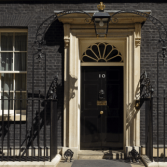 How would you play this (political) party-game?
How would you play this (political) party-game? A general election will be called in 2024 – how would you rebrand the major parties to improve their chances, or perhaps reflect the reality of their policies?
 Have you seen those you serve?
Have you seen those you serve? Today, business prioritises speed over quality, efficiency over effectiveness, “the now” over longer-term impact – amplified by a preference for flexible/WFH. It is easy to shortcut proper insights and inspiration and this can also be true of connection with colleagues. Get out there! See people face-to-face. Advocate for those you serve.
 How do we drive right to repair?
How do we drive right to repair? How are you designing products to be repaired, rather than thrown away for a minor fault? In 2024, let’s embrace design practices which support ease of disassembly and accessible, affordable repairs.
 Does your audience always get your message?
Does your audience always get your message? Success in communication involves precise tailoring, and that means really understanding each audience. Example? Take a look at this video ad from The Beefy Boys, Hereford’s artisanal burger entrepreneurs-with-attitude. Make sure you watch right to the end. Merry Christmas!
 How persuasive will you be in 2024?
How persuasive will you be in 2024? The way to get somebody to do something well is to make them want to do it. As Henry Ford said: “If there is any one secret of success, it lies in the ability to see the other person’s point of view as well as your own”.
 Who’s looking forward to January?
Who’s looking forward to January? We all know the importance of an engaged and motivated team so make sure you find some time to reset after the festive break to gather their feedback and make your agency even better. As a leader you don’t always have to be the one with all the answers…
DBA Experts are accredited expert consultants who have sustained and relevant experience in supporting the design industry. Browse the Register of Experts and get in touch >
* A new statistic from Up to the Light’s 2024 ‘What Clients Think’ report which will be published in March.


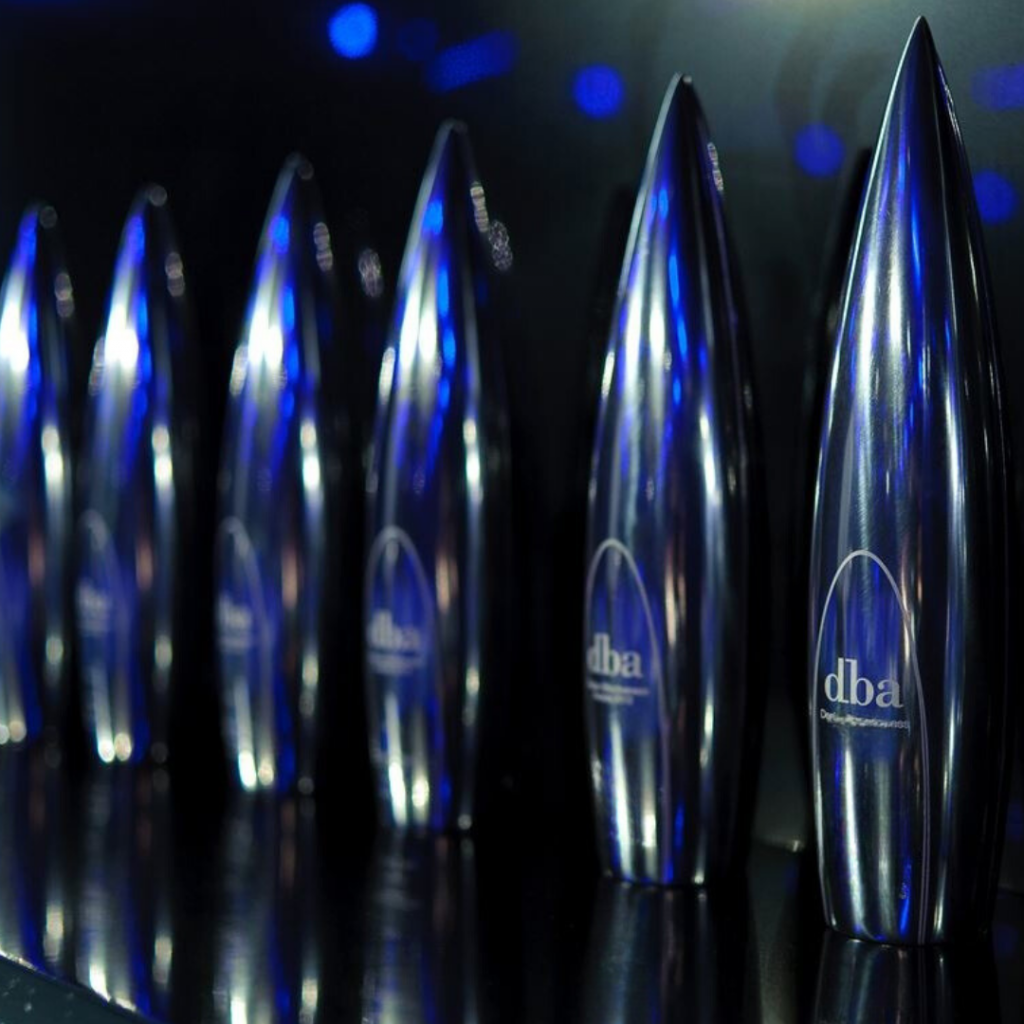







There was much, much more covered in the hour – you really had to be there. Do make sure you join us in our next DBA Members’ Forum on Monday 15 January at 4pm GMT, look out for an email from me in a few weeks with more details. If you would like to attend, get in touch here.
We’ve captured the conversation highlights from the all the Members’ Forums which have taken place in 2023 and they can all be found here.
Members’ Forums are monthly online meetings for senior leaders at DBA member businesses.
Not yet a member? Join the DBA community to share, inspire and learn from your peers in the design industry. Be part of your representative body, owned by the members and working for the members, as we support you in the running of your business. Find out more about DBA membership here.










There was much, much more covered in the hour – you really had to be there. Do make sure you join us in our next DBA Members’ Forum on Monday 4 December at 4pm GMT, look out for an email from me in a few weeks with more details. If you would like to attend, get in touch here.










 Why did you decide to participate in Twenty/Twenty?
Why did you decide to participate in Twenty/Twenty?JK: “I was at a stage in my business where I wanted to grow it, but I needed to grow myself first. Having just come from working as a designer in an agency, to running my own with a small team, I had no previous leadership experience so wanted to build on this so I could lead and mentor my own team, and push the business forward with conviction and confidence. I believed that Twenty/Twenty was what I needed. The programme was also recommended to me by several professional connections.”
JK: “My mentor was Studio Phoenix’s co-founder, Jonny Westcar and he was a very good match. We connected on both a professional and personal level. He had been through similar experiences in the past so was able to relate easily to my challenges. We met in person for most of the sessions, either in London (near him) or Edinburgh (near me), and he mentioned that he also got a lot of benefits from the sessions too.”
JK: “Everything I listed at the start that I wanted to achieve and gain clarity on, has been answered. Also the matching process itself has exceeded my expectations. Working with Jonny, specifically, has been a real pleasure and I look forward to every session. I don’t think you could have picked a better match for my needs and personality.”
JK: “I have benefitted from it hugely, because I set out to achieve certain things and gain clarity, understanding and confidence in my path and vision, and it has also been beneficial for someone to relate to my specific rollercoaster and therefore use as a sounding board.
My business has benefitted because I have benefitted, and a lot of the clarity in leadership and vision has passed to my team in a positive way.
As a business owner with vision, goals and struggles, the value of being able to learn from, and bounce ideas off someone who has already walked a similar path can only be beneficial.”
JK: “Investing in yourself is one of the most effective things you can do. Be organised and have a clear agenda with incremental goals, then open yourself up to the honesty, guidance, support and industry specific knowledge of the mentors. I will definitely be taking part in Twenty/Twenty mentoring again at some stage.”
Being part of a mentoring relationship can be transformational. There’s no other programme like the DBA’s Twenty/Twenty mentoring out there and there’s nothing to stop anyone from benefiting from this ground-breaking process. You just have to start. Find out more and apply by Wednesday 29 November.
Image credits
Augusto Lopes | Unsplash
Jonny Kermode










 The DBA’s Twenty/Twenty business mentoring programme has been running since 2011 and has created a community of hundreds of DBA members who have used the process to make more informed decisions about their businesses, their people and themselves.
The DBA’s Twenty/Twenty business mentoring programme has been running since 2011 and has created a community of hundreds of DBA members who have used the process to make more informed decisions about their businesses, their people and themselves.
DBA mentors are the leading lights of design leadership. People who have faced the highs and lows of working in our industry and recognise the specific challenges faced by mentees, yet are further along in the journey and can offer that crucial perspective needed for growth. Together with them, mentees work through a 12-month process of developmental mentoring providing the supported time and space needed for true change to happen.
Our resources and training sessions are developed and led by some of Europe’s most experienced and respected mentoring experts, and the cohort approach to the programme means that you benefit from the shared experiences of your fellow mentees as you travel through the process.
Everyone on the programme – both mentors and mentees – are equipped with the specific skills and techniques needed to create successful mentoring conversations. Our guided, yet light-touch framework gives you the support you need to establish a strong relationship, and then gives you the freedom to define together how your individual experience will work. Will you meet online or in person? Will you stick to the most usual format of meeting for an hour each month, or will you meet more regularly? Will the time between sessions be bridged with active work to bring back to the next meeting, or will your sessions be more focussed on the simple experience of that protected time for reflection and trusting the growth that comes from that? It’s all up to you.
And you can tackle whatever subjects and issues you want to with your mentor. This is a completely tailored experience – you are matched with a mentor whose background, personality, situation and aspirations resonate with your own. They are simply further down the line and with more battle scars under their belt. But whatever you’re bringing to the table to work on – be that specific business conundrums, personal development goals or a need to tackle the next big leap for you or your business – the quality of our careful and rigorous matching process means you’ll have the right mentor for your journey. The longevity of our programme is down to the good mentor/mentee matches we make.
What if you don’t know what you want to work on with your mentor, but the process sounds right for you, right now? Well, that’s great too and not an unusual starting point. You’ll work with your mentor to identify your goals early on in the year, and then shape them as you go. Who knows what you and your mentor might uncover together and where you’ll be in 12 months time.
There’s no other programme like the DBA’s Twenty/Twenty mentoring out there and there’s nothing to stop anyone from benefiting from this ground-breaking process. You just have to start.
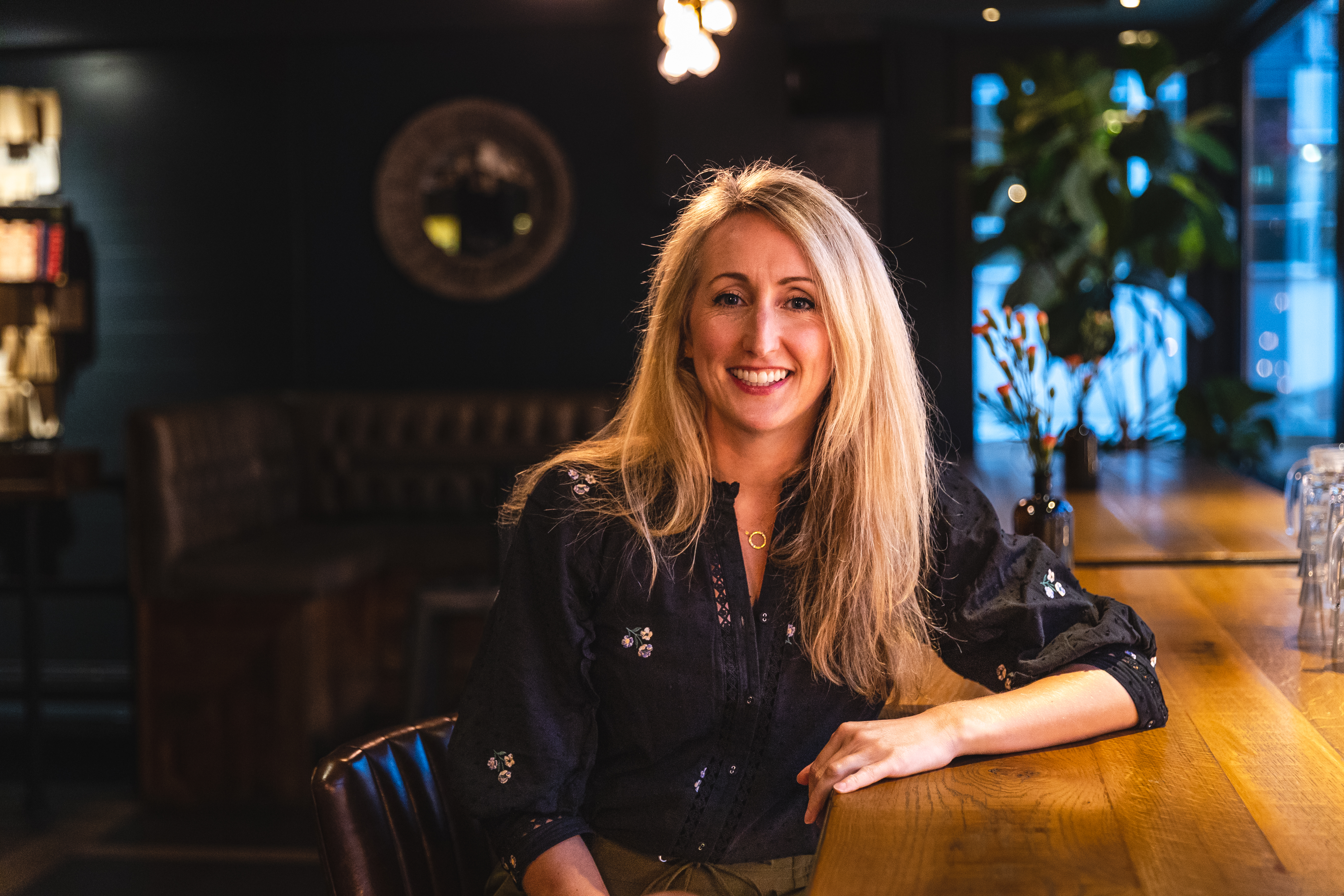 “Since launching Twenty/Twenty all the way back in 2011, it’s been incredibly rewarding seeing the passion and commitment of the mentors who give their time to this process, and the impact and influence the programme has on the businesses and lives of the mentees. Mentoring is all about empowering and developing yourself and those around you, building confidence in your leadership abilities and resilience for the road ahead. It’s a privilege to be able to work with so many of the leading lights of the industry each year in this way and we’re excited to welcome more for next year.” Sally Lukins, Strategy & Business Director, DBA
“Since launching Twenty/Twenty all the way back in 2011, it’s been incredibly rewarding seeing the passion and commitment of the mentors who give their time to this process, and the impact and influence the programme has on the businesses and lives of the mentees. Mentoring is all about empowering and developing yourself and those around you, building confidence in your leadership abilities and resilience for the road ahead. It’s a privilege to be able to work with so many of the leading lights of the industry each year in this way and we’re excited to welcome more for next year.” Sally Lukins, Strategy & Business Director, DBA
“Twenty/Twenty mentoring helped grow my confidence tenfold. I received robust, solid advice from my mentor and found it invaluable how he shared his experiences. He didn’t tell me ‘what to do’ but provided an open forum to discuss potential scenarios and solutions. I have now got better boundaries around valuing what we deliver with confidence, and I am stronger at negotiating and saying no.”
“My mentor has been a perfect match for me both professionally and personally.”
“Twenty/Twenty is unquestionably valuable and eye-opening. Speaking to someone with deep expertise and experience, who has been through it all, provides incredible context. The impartial, non-judgemental optics of the mentor/mentee relationship offers a unique lens on thoughts, ideas and challenges. You simply can’t have these conversations with colleagues.”










 The 2023 DBA Annual Survey Report has found that agencies’ biggest concern in the immediate, near and long-term is the new business pipeline.
The 2023 DBA Annual Survey Report has found that agencies’ biggest concern in the immediate, near and long-term is the new business pipeline.
“I believe we have a perfect storm of change affecting businesses at this time” says Lucy Mann. ”Post-Brexit, post-Covid, increased economic and political uncertainty not to mention the whirling spectre of emerging tech means that both clients and agencies are feeling the pressure. For many agencies, previously reliable revenue is proving less so and decision making has become far more protracted with new clients.”
Lucy’s advice: “New Business” is a particularly unhelpful term at times like this. Instead let’s think about how we can win and grow the right kind of new relationships. We need to understand the pressures clients are dealing with and the problems they need to solve and demonstrate clearly how we help. We must ask more questions, do more research, be curious and interested. Sustainable new business means a focus on starting conversations rather than simply looking for projects.”
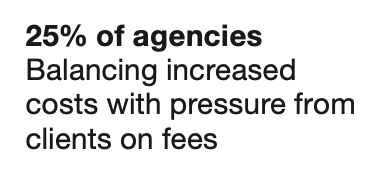 For around a quarter of agencies, balancing increased costs with pressure from clients on fees is a key concern in the short, medium and long-term.
For around a quarter of agencies, balancing increased costs with pressure from clients on fees is a key concern in the short, medium and long-term.
Agencies are increasingly needing to have difficult conversations around value and rates whilst juggling a concern around reduction in client budgets overall.
“It’s always been important for agencies to champion the value they bring but perhaps it’s becoming more crucial,” says Adrian Day. “Artificial intelligence, online on-demand design services, lower barriers to entry and cross-border competition all mandate that you promote the unique value you bring.”
When it comes to navigating conversations with clients around fees, Adrian advises:
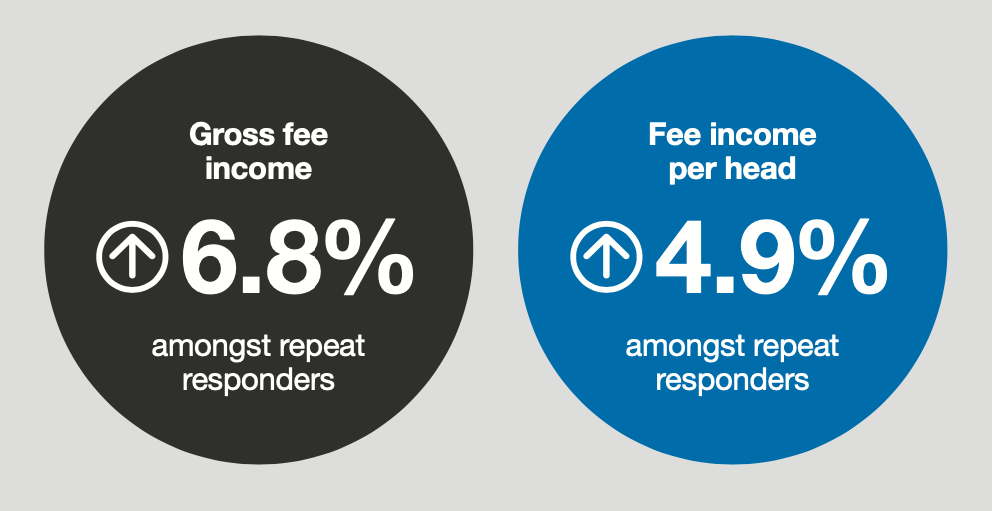 Gross fee income and income per head have both increased on last year amongst the Survey’s repeat responders. However, the report highlights that in the context of inflationary rates, such increases don’t represent real growth.
Gross fee income and income per head have both increased on last year amongst the Survey’s repeat responders. However, the report highlights that in the context of inflationary rates, such increases don’t represent real growth.
Sim Thirunesan cautions that effective cash flow management will be key. “If cost base increases and revenue growth rate don’t match, there will be a squeeze on cashflow,” she says. “Incurring debt will also cost more, therefore agencies need to be aggressive in contract negotiation and cost management.”
Inflation should be factored into forecasts to ensure real growth targets are put into place.
“Inflation can be added to the desired revenue growth when budgeting, but serious consideration must be given to the reality of price increases and thought must be given to price sensitivity versus perceived value,” says Sim. “An effective pricing strategy which regularly reviews pricing is an important discipline within the agency.”
Sim recommends that in line with forecasting revenue growth, you should review the prior year’s profit margin and determine the desired increase. “This is a key KPI to set and measure your agency’s performance,” she says. “Suppliers and your staff will also be looking for increases, so careful management is required, and a variety of strategies can be employed to ensure a successful outcome.”
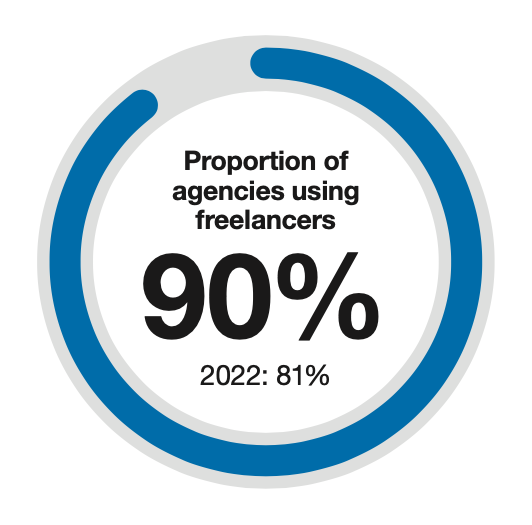 The number of agencies engaging workers on a freelance basis has increased by 9% in a year. While freelancers as a percentage of workforce has almost doubled from 6.6% in 2020 to 12.5% in 2023.
The number of agencies engaging workers on a freelance basis has increased by 9% in a year. While freelancers as a percentage of workforce has almost doubled from 6.6% in 2020 to 12.5% in 2023.
Says Aliya Vigor-Robertson, “Freelancers offer great flexibility for businesses, especially for design businesses whose client/project work comes in ebbs and flows. It also allows businesses to dip into specialisms that they may not have in-house or may not require 100% of the time, which in turn could be more cost effective.”
When using freelancers Aliya recommends agencies should:
“IR35 is still a very important consideration for design businesses engaging with freelancers,” says Aliya. “Businesses should consider whether the small business exemption applies to them (and continues to, if they see growth). If not, they are responsible for determining the freelancer’s IR35 status. We would recommend that businesses review any new freelancers to identify whether they fall inside or outside of IR35,” Aliya adds. “There are handy checklists available online to support (like this one), or speak to a specialist.”
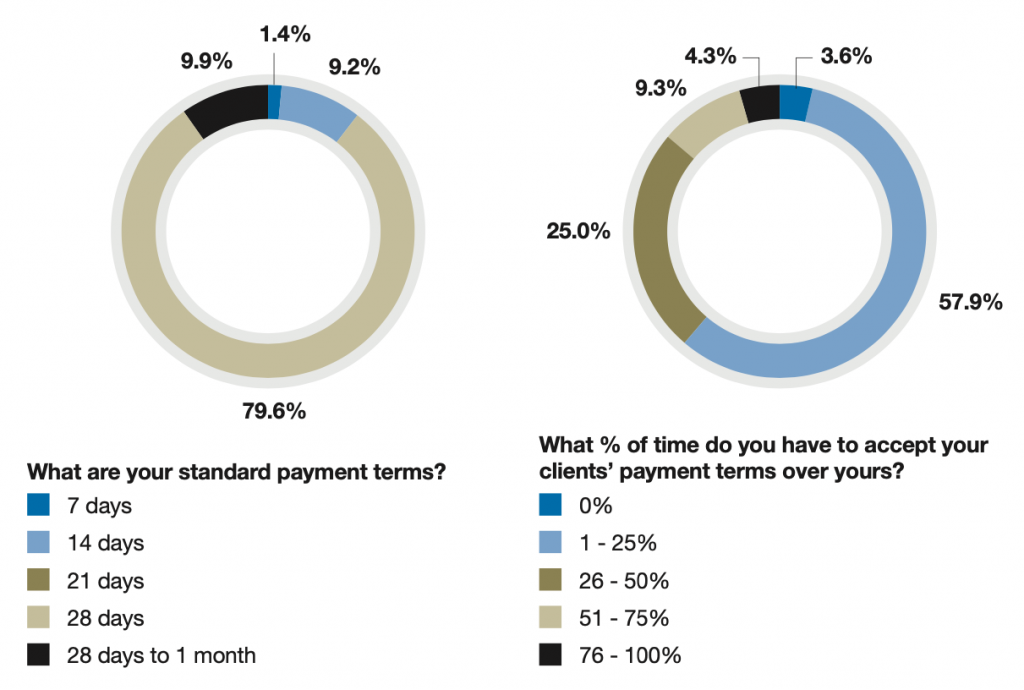 The industry standard is to offer one-month payment terms, and this has increased from 54% of respondents in 2021 to 80% in 2023. But, payment terms are not always accepted by clients – only 3.6% of agencies always get clients to accept their terms rather than having the clients’ terms imposed on them.
The industry standard is to offer one-month payment terms, and this has increased from 54% of respondents in 2021 to 80% in 2023. But, payment terms are not always accepted by clients – only 3.6% of agencies always get clients to accept their terms rather than having the clients’ terms imposed on them.
Chris Lang highlights that the main thing to consider before accepting a client’s longer payment terms “is the availability of enough cash to get through until money is received from the client.”
“If in any doubt,” he says, “consider exploring funding options as early as possible. If extra funding is needed ensure you are making sufficient profit from the work to make up for the cost of any borrowings. The earlier this is explored the easier, and likely cheaper, any borrowings will be.”
A scenario where longer payment terms may be acceptable is when it is for a fee retainer (i.e. no external costs.) “The caveat being that there is enough working capital in the company to allow this,” says Chris. “Longer payment terms should definitely be avoided if buying in costs to be recharged to the client, for which payment is needed prior to being paid by the client.”
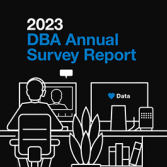 The DBA Annual Survey Report is an invaluable members-only business tool which enables you to benchmark your financial performance with your peers. Released each October it covers fees, salaries, utilisation, income, recovery rates, benefits and trends within DBA member companies. Data is segmented by geography and size of agency to make comparisons more relevant. Find out how members use the Report and how to access a copy.
The DBA Annual Survey Report is an invaluable members-only business tool which enables you to benchmark your financial performance with your peers. Released each October it covers fees, salaries, utilisation, income, recovery rates, benefits and trends within DBA member companies. Data is segmented by geography and size of agency to make comparisons more relevant. Find out how members use the Report and how to access a copy.
The Report is produced in collaboration with Moore Kingston Smith and with the support of our sponsors Paprika and VisionFR.
DBA members can also login and watch a recording of the 2023 DBA Annual Survey Report launch webinar, featuring Esther Carder, Partner at Moore Kingston Smith presenting a detailed analysis of the benchmarking data and trends.

Adrian Day: As a Non-Executive Director, Adrian can help your business perform better by acting as your experienced, objective and supportive ‘critical friend’.
Aliya Vigor-Robertson : Aliya and her business partner Sue run an HR Consultancy called JourneyHR. They have a brilliant team of creative industry HR specialists who work with a large community of award winning clients helping them attract and retain their talent.
: Aliya and her business partner Sue run an HR Consultancy called JourneyHR. They have a brilliant team of creative industry HR specialists who work with a large community of award winning clients helping them attract and retain their talent.
 Chris Lang: Chris and his team have worked with many companies over the years to help improve their financial performance, not only by processing day to day data but also improving processes and commercial awareness throughout the comany. This approach ensures high quality information and therefore better decision making at the top level.
Chris Lang: Chris and his team have worked with many companies over the years to help improve their financial performance, not only by processing day to day data but also improving processes and commercial awareness throughout the comany. This approach ensures high quality information and therefore better decision making at the top level.

Lucy Mann: Lucy helps agencies optimise their new business performance. Drawing on 30 years’ new business experience, Lucy works with agencies to create workable new business and marketing strategies and plans, mentors in house new business teams and helps client service teams build deeper, more profitable relationships.
 Sim Thirunesan: Sim provides dynamic financial insight and strategic business management support to creative professionals, allowing them to focus on excelling at what they do best. By providing clear insight, she can help you make the best decisions for your business and enable you to plan effectively, freeing up your time to focus on unlocking your maximum potential and produce the best work for your clients.
Sim Thirunesan: Sim provides dynamic financial insight and strategic business management support to creative professionals, allowing them to focus on excelling at what they do best. By providing clear insight, she can help you make the best decisions for your business and enable you to plan effectively, freeing up your time to focus on unlocking your maximum potential and produce the best work for your clients.
DBA Experts are here to help you navigate the challenges and decisions you face as you grow your business. Our register of accredited expert consultants have sustained and relevant experience in supporting the design industry, so you can rest assured that you will be getting sound, high-level support.
Our Experts have extensive experience supporting the creative industries and are:
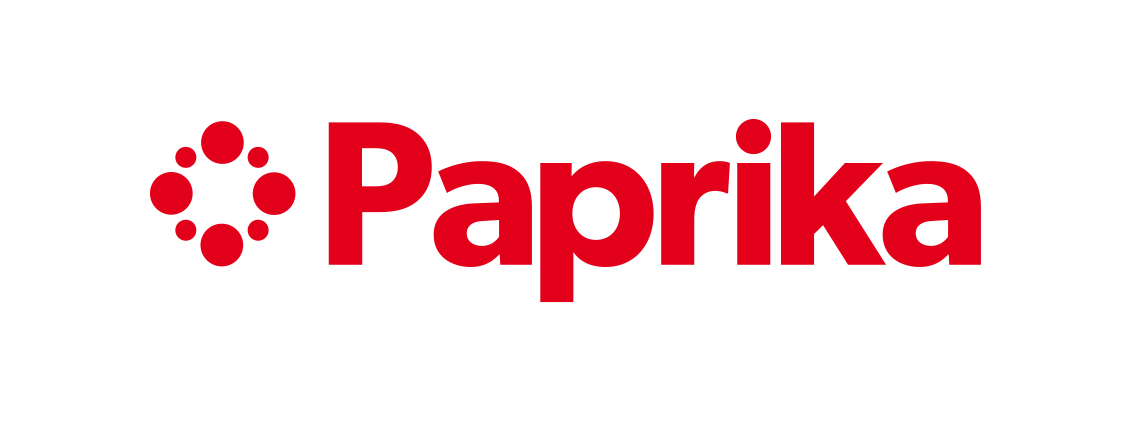
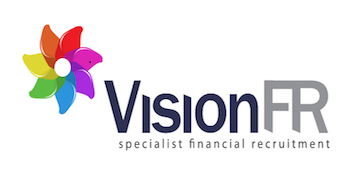

The 2023 DBA Annual Survey Report is produced in collaboration with Moore Kingston Smith and with the support of our sponsors Paprika and VisionFR.










 Having a member of the leadership team with a keen eye on the financials to help drive the commercial success of an agency is key, whatever the size of a creative agency.
Having a member of the leadership team with a keen eye on the financials to help drive the commercial success of an agency is key, whatever the size of a creative agency.
Some start-up ventures may set out with a finance director as part of their founding team, but this is probably the exception to the norm and what follows is more applicable to those agencies that don’t start out with that luxury.
Typically, most young agencies either engage a partner from an accountancy firm – often someone who has given them invaluable advice and support during their set-up – or benefit from having of one of the owner/founders having a particular flare for the financial side of the business.
As any business grows and develops, thought will be given as to whether the senior finance support they’re getting is the most appropriate route and whether a dedicated in-house Finance Director might be a better solution. But how do you know when it’s the right time for an employed or consultant FD?
This isn’t something that’s clear-cut and may vary from agency to agency but, ultimately, it’s a combination of:
Business size/growth – when does the volume of financial activity and transactions dictate the need for some in-house senior specialist support? We think this is likely to be when the business is operating at around the £2-3m fee income (or gross profit) level but the business also probably needs to be anticipating growth for the FD to help manage as well.
Business complexity – does the business operate from multiple locations, in multiple currencies or with multiple revenue streams, entities or divisions? Obviously, the more complex the business the earlier the specialist support will be needed.
 How can an FD benefit your business?
How can an FD benefit your business?
There is likely to be more dedicated time given to understanding the overall business strategy and how this translates into financial planning, forecasting and goals – monthly, annual and longer term.
This additional time and understanding engenders a stronger connectivity and emotional engagement from the FD – with a full appreciation of the monthly targets, the people involved in the business and the creative proposals, they will live and breathe every pitch outcome as they recognise the impact of wins and losses.
They will business partner with the wider (non-finance) staff members within the agency and engage with issues they are facing on a timely basis; they are at hand to help with client and new business proposals, pricing, procurement issues as they arise meaning less delay and an ability to act quickly.
Supporting the efficient running of the agency in terms of resourcing, reporting and systems, cost control & risk management; leading or supporting other operational functions (e.g. IT, Facilities, HR); developing relevant financial management information and KPIs, and improving commercial acumen of account handlers should all be further responsibilities of the Finance Director.
Running an SME business throws ad hoc issues at you all the time – things can blind side you, for example matters with suppliers, landlords, cashflow, staff, utilisation, overservicing, potential M&A, taxation and Inland Revenue, legal matters, transfer pricing, R&D claims to name a few. As a business grows, having access to a senior Finance Director to support resolution of these issues becomes a necessity rather than a luxury.
In most instances, the Finance Director should more than cover their overhead by improving your profitability from clients or projects and/or also controlling costs and risk; or by freeing up other senior leadership time to do more income generating client work.
Also bear in mind the alternative to a full-time FD. A portfolio or fractional FD will work with you on a part-time basis. This provides much of the above support in say, 2-3 days per week, and obviously limits the financial outlay.
However, the fractional/portfolio FD route – valuable as it is in terms getting the ball rolling and supporting strategy and key financial decision-making – may not always suit.
The fractional FD will not always be available at the ‘drop of a hat’ as they will have other commitments – you may have to wait a day or two to get comments on client contracts, for example and such delays may not work for all businesses. And you may find that as the business grows, they may not have the capacity to provide more time. It’s therefore important the rest of the finance team is well structured below such a fractional FD to ensure the day to day running standards are maintained and that it can scale up as/when the business does grow.
For a more detailed conversation on your agency requirements and options for Finance Director support, as well as any other needs in your finance team, please contact Deborah or Greg at VisionFR.










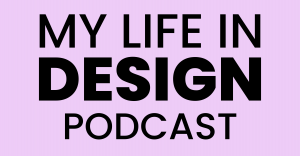 Over 30 of the design industry’s most exciting creatives, thinkers and strategists, including Paula Scher of Pentagram, Gush Mundae of Bulletproof, Brian Collins of COLLINs, and new D&AD president Jack Renick have shared their lives in design on the podcast. From the discovery that design was a thing that they could build a career upon, to education, first jobs and beyond. With each guest sharing their tips to the next generation of young designers.
Over 30 of the design industry’s most exciting creatives, thinkers and strategists, including Paula Scher of Pentagram, Gush Mundae of Bulletproof, Brian Collins of COLLINs, and new D&AD president Jack Renick have shared their lives in design on the podcast. From the discovery that design was a thing that they could build a career upon, to education, first jobs and beyond. With each guest sharing their tips to the next generation of young designers.
 This series, Claire will be speaking to Michael Wolff, celebrating his 60 years of working in brand design, with the launch of his new autobiography, and will also include the founders of drinks specialist design agency Denomination, Rowena Curlewis and Margaret Nolan.
This series, Claire will be speaking to Michael Wolff, celebrating his 60 years of working in brand design, with the launch of his new autobiography, and will also include the founders of drinks specialist design agency Denomination, Rowena Curlewis and Margaret Nolan.
My Life in Design can be found on all podcast platforms and is a collaboration between brand design PR specialist Red Setter and the DBA.
Head here for details and to tune into current and past episodes.











“In the course of the last year we’ve seen the design industry come under more pressure than we’ve seen for many years. As the economic headwinds grew and companies looked to cut costs, we’ve seen projects put on hold and for the first time in many years the industry retracted. Whilst I recognise the need to manage costs as sales fall, it’s inevitable overheads will have to be trimmed down. But cutting future product development and innovation spending is a short term gain and a longer term problem.
As companies seek out efficiency gains and look for opportunities to standardise, it’s easy to see why design systems and AI are seen as potential saviours. But this is where we need to exercise caution and ensure we integrate and leverage AI as an augmentation of the creative process and not a replacement. As with any process, set of tools or indeed system, it’s ultimately only as good as the people who are involved.
Of course design is only a part of the new product development and innovation process. But let’s not be shy of clearly stating the value we, as a design profession, bring to the table. Now more than ever we need the passion, the empathy and ultimately the creativity that good design(ers) will always bring. Let’s continue to build the case for design by celebrating diversity and nurturing creativity, to build better solutions that deliver better outcomes for people and businesses.”
“It’s an incredible privilege to be a part of the DBA Design Effectiveness Awards’ judging team. The panel of judges are all at the top of their games and come with a broad variety of experiences from a diverse set of industries.
I’m looking forward to some robust discussions as we review and challenge the entries to ensure they clearly demonstrate the true impact that design has had. And as more businesses and brands strive to be known as being purpose led, I’m looking forward to seeing more entries where design can clearly demonstrate its benefits to society, the broader economy or the environment.
I’m hoping we’ll see many inspiring cases where design has helped deepen understanding of human behaviours and how to drive the change needed in delivering more sustainable and equitable solutions for society. But more than anything else I’m looking forward to learning more and being inspired by a dazzling display of creativity and design talent that has clearly delivered an impact.”
“I love the fact the DBA Design Effectiveness Awards are far more than the usual celebration of good design. Entrants need to demonstrate impact and have evidence to show they achieved, or surpassed the intended goal. This can be an incredibly powerful asset for designers and design leaders who so often struggle to demonstrate the value of design to their counterparts in a business. I’ve had the privilege of judging a number of international design awards and what really sets the DBA Design Effectiveness Awards apart from others is this focus on demonstrating impact, through good design.
Behind every one of the winning entries are effective collaborations between businesses and designers; teams who have gone the extra mile to ensure they’ve understood the target user or audience. They’ve equally paid attention to the commercial realities of costs, as they’ve made informed choices and trade offs. It’s also evident that great design can only happen when you have frictionless collaboration across all parts of the business, from concept through to launch. The DBA Design Effectiveness Award winners clearly demonstrate why it makes good business sense to enable and support designers to do their best work.”









